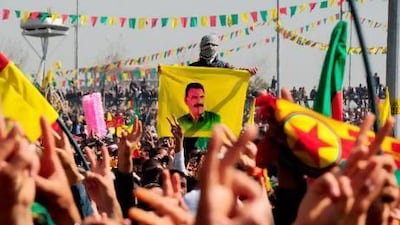ISTANBUL // Jailed Kurdish rebel leader Abdullah Ocalan yesterday ordered his troops to cease fire and withdraw from Turkey, in the best hope yet of an end to three decades of war that has claimed 40,000 lives.
"A new era is beginning," Mr Ocalan said in a statement read by Kurdish politicians to hundreds of thousands of jubilant Kurds gathered to celebrate the new year festival of Nowruz, outside of Diyarbakir in south-east Turkey.
"We have reached the point at which weapons should be silenced and ideas should speak. I say the threshold has been reached at which our armed elements are to be withdrawn over the border" to neighbouring northern Iraq.
Mr Ocalan was directing his call to the fighters of his Kurdistan Workers' Party (PKK).
Recep Tayyip Erdogan, the Turkish prime minister, welcomed the call for a ceasefire but said Turkey wanted to see "to what extent it is implemented" by the rebels.
In Amsterdam, Mr Erdogan said Turkish forces would cease operations against the rebels as soon as Mr Ocalan's call was implemented.
He this year said the military would give the rebels free passage to northern Iraq, where the PKK is based.
Mr Ocalan's ceasefire call came after months of negotiations between the PKK founder and officials of Turkey's intelligence service, MIT.
"This is not the time for war and strife," he said. "This is a time to come together, embrace each other and forgive each other."
Murat Karayilan, acting PKK leader, said rebels would heed the call.
"We will bring to life the process started by leader Apo with determination," Mr Karayilan said, according to the ANF news agency, a PKK mouthpiece. "Apo" is Ocalan's nickname. Rebels are expected to heed the call.
Mr Ocalan said all sides in the conflict were responsible for the success of the peace process, but did not spell out demands to Turkey beyond calling for more democracy and an end to discrimination against Kurds.
"We will set brotherhood and unity between the peoples against the policy of marginalisation," he said. "A door is opening that leads from armed resistance to democratic politics."
Mr Ocalan, who has been in prison since 1999, called for "an approach based on democratic rights, freedom and equality", a reference to work on a new constitution under way in Turkey's parliament.
Kurdish politicians have called the new constitution a chance to enshrine political and cultural rights for Turkey's 12 million Kurds.
Mr Ocalan's five-page statement was read out first in Kurdish, then in Turkish by Pervin Buldan and Sirri Sureyya Onder, legislators of the Party for Peace and Democracy (BDP), Turkey's biggest Kurdish party.
Turkish and Kurdish officials see the talks between Mr Ocalan and the MIT as the best chance yet to end an armed conflict that began in 1984.
Prof Rustem Erkan, a sociologist at Dicle University in Diyarbakir, said the statement could be a turning point.
"He has formulated a farewell to arms," Prof Erkan told the NTV news channel.
Mr Ocalan and the Turkish government appeared to be determined to solve the conflict, he said. "We should use this energy well."
Sadullah Ergin, the justice minister, said this week that the road map agreed to by Mr Ocalan and the MIT included a timeframe for how the peace process would play out in the coming months, with a pledge by the PKK leader that all armed rebels would leave Turkey for rebel bases in northern Iraq.
"There are clear periods," Mr Ergin said. "The ceasefire and the withdrawal will take place simultaneously."
Asked if that part of the process would be completed by the end of the year, he answered: "That is correct."
Once the fighters of the PKK, banned as a terrorist group by Turkey and western countries, have left Turkey, both sides will turn their attention to securing a permanent end of the armed conflict.
Reports say the PKK may hand over its arsenal to the Kurdish government of northern Iraq.
PKK soldiers would be able to return to Turkey, while a permanent exile in Iraq or Europe for PKK leaders was under discussion, the reports said.
Mr Ergin said the Turkish parliament would make legal arrangements if necessary.
But he warned there was "no guarantee" of success. Several earlier attempts to end the Kurdish conflict have failed.
The government has so far avoided any concrete promises in return for the PKK ceasefire.
Mr Erdogan has said he wants to convene a commission of "wise men" from outside the government to make proposals, but his ministers have already rejected the idea of a general amnesty for all PKK members.
Kurdish politicians say they hope Mr Ocalan will be released from prison as part of the peace process.
There were cheers and chants of "Apo, Apo"as his letter was read out yesterday.
But while the huge crowd gathered on the grassy plain outside Diyarbakir appeared happy to hear from their jailed leader, there was no mass outburst of emotion at his words. Afterwards, some even voiced dissent.
"For peace it should be done with BDP and the PKK to be taken seriously, rather than Ocalan," said Ayfer Melik, 47, a resident of Diyarbakir. "Because he is in the prison of the enemy."
Ms Melik was also opposed to disarmament of the PKK because "the weapons are our guarantee".
Nursel Ildiz, 20, from Turkey's eastern Elazig province, held more hope.
"We are very tired. We want peace, we want the problems to be solved," Ms Ildiz said.
Just before setting out for Diyarbakir, "Turkish racists" tried to "make a problem" for her, she said.
Underlining the sensitivities that exist on both sides, Mr Erdogan noted yesterday that no Turkish flag was flown at the Nowruz festivities in Diyarbakir.
He described the lack of a flag as a "provocative act" and contrary to spirit of Mr Ocalan's message for peace.
* Thomas Seibert reported from Istanbul and Justin Vela from Diyarbakir

